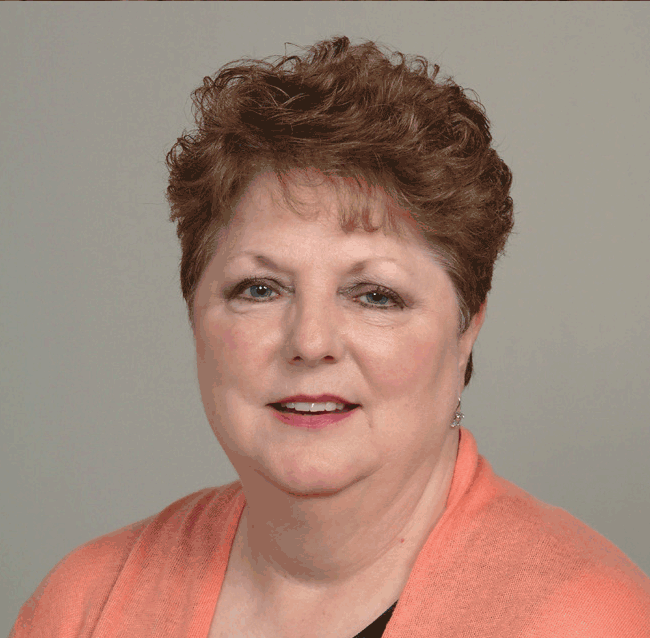Susan Bruce, MSN, RN, OCN, AOCNS®

Raleigh, NC
Position: Director-at-Large
Susan D. Bruce, MSN, RN, OCN®, AOCNS®
Clinical Nurse Specialist
Duke Raleigh Cancer Center-Raleigh
NC Raleigh, NC
ONS member: 27 years
EDUCATION:
2007: Duke University School of Nursing, MSN
1978: University of Akron, BSN
ONS PARTICIPATION (national and local):
2016: ONCC Nominating Chair
2014-2016: ONCC Nominating Committee
2013: ONCC Board of Directors, President
2011-2013: ONCC Board of Directors, Vice President
2008-2011: ONCC Board of Directors
2016: ONS Oncology Nurse Generalist Competencies
WORK RELATED SKILLS AND LEADERSHIP:
2009-current; Clinical Nurse Specialist
2012-2013; Interim Clinical Operations Director
2013-current; certified Tobacco Treatment Specialist
2013-current; Coordinator of Schwartz Rounds
2010-current; Ethics Committee member
2007-2013; Duke University Institutional Review Board #1; nursing representative
HEALTH CARE/ CANCER ORGANIZATIONS EXPERIENCE, OTHER PROFESSIONAL NURSING ORGANIZATIONS /Additional experience (community, political etc.):
2013-current; National Association of Clinical Nurse Specialists
2011-2012; Triangle Chapter of Hospice and Palliative Nurses-President
2009-2010; Triangle Chapter of Hospice and Palliative Nurses-Vice president 2010-2013; Co-Captain for team "Silence Breakers" for the Annual Gail Parkins Ovarian Walk/Run 2005-2007 Sigma Theta Tau-beta Epsilon chapter-Nominating Chair
Position Statement: Serving six years on the Oncology Nursing Certification Corporation (ONCC) Board of Directors (member, vice president, and president), I developed numerous leaderships skills including, board governance, financial stewardship, strategic planning, and viewing the “big picture” on a national level. I believe this skill set is transferable to a position on the Oncology Nursing Society (ONS) Board of Directors and will lend my clinical and leadership expertise.
My leadership journey began in 1998 when I participated in the inaugural ONS Leadership Development Institute. Since them I have participated in a variety of project teams, review boards, editorial boards, and most recently in the development of the oncology nurse generalist competencies. I have published and presented locally, regionally, and nationally on a variety of oncology topics. Embracing new challenges fosters my professional development and commitment to lifelong learning.
I am ready to listen and advocate for ONS members, their needs as we move forward into a future of uncertainty in oncology care and how that will impact our patients and the services they receive. I would welcome a voice at the table to influence oncology nursing and ultimately the delivery of cancer care.
How have you advanced excellence in oncology nursing and quality cancer care? As an oncology Clinical Nurse Specialist, it is imperative to role model best practices and innovations in striving to advance cancer care. In 2013, I decided to take the next step in addressing an unmet need in our institution. I enrolled in an intensive course to become a certified tobacco treatment specialist (CTTS). I returned and outlined my implementation plan for smoking cessation counseling with patients. My referrals were slow at first but my lung cancer specialist embraced my program and became my primary referral source. Providers who were seeing 20-30 patients a day had limited time to counsel patients beyond the message that they should quit smoking.
In 2016, our organization brought a quit smoking program to the main campus. I immediately saw an opportunity for interdisciplinary collaboration with them to grow and enhance my program. Upon further discussion, they didn’t want to change my program, but enhance it with some additional resources. By 2016, I had seen over 300 patients and my outcomes show a 36% quit rate for 108 patients.
Provide a recent example of how you used innovation in your leadership experiences. Ten months ago, our institution’s leadership made a strategic decision to relocate our oncology patients to a surgical oncology floor to deliver a model of care where oncology is centralized to one unit. Timeline: 1 month. The biggest challenge was none of the surgical oncology nurses had chemotherapy administration experience. As the CNS, I lead the collaboration with unit nursing and cancer center nursing leadership. I developed content for an 8-hour Oncology Boot Camp. A 4-hour simulation component was added to measure what the nurses learned in boot camp. After successful completion of the adult chemo test, I coordinated placement of each nurse into one of our three infusion clinics with a preceptor for 8-hours of actual “hands on” chemo therapy administration experience.
This preceptor-guided experience provided not only chemotherapy calculations but administration of chemotherapy and care of the patient. Given the limited chemotherapy administered in the inpatient setting, I provided leader oversight to the preceptors and nurses during this time. To assist with learning medical oncology, I conduct weekly mini education sessions on various topics. The nurses have embraced this new opportunity and the transition has been a huge success.
Provide a recent example of how you used advocacy in your leadership experiences. My advocacy for patients has been demonstrated by my ongoing commitment to assist patients quit smoking during an incredibly stressful time of cancer diagnosis and treatment. I provide them with evidence-based medications, education on addiction and ongoing behavioral support.
I advocate for patients with pharmaceutical companies to provide free drug for eligible patients that are financially disadvantaged. It is one of my highest achievements as I celebrate this success with my patients. I advocate for nursing by serving as a positive role model. I am focused on ensuring that care is provided in the safest manner possible to patient. I am dedicated to evidence-based nursing practice, standards of care and best practices that ultimately lead to the best care for our patients. I advocate and help determine policy across our health care system, particularly in oncology. My vast experience in oncology plays a key role.
Having a seat on the ONS Board of Directors would allow me to continue to develop my role as an advocate on a national level working in complex systems to bring about change that will ultimately influence the health and well-being of our patients.

